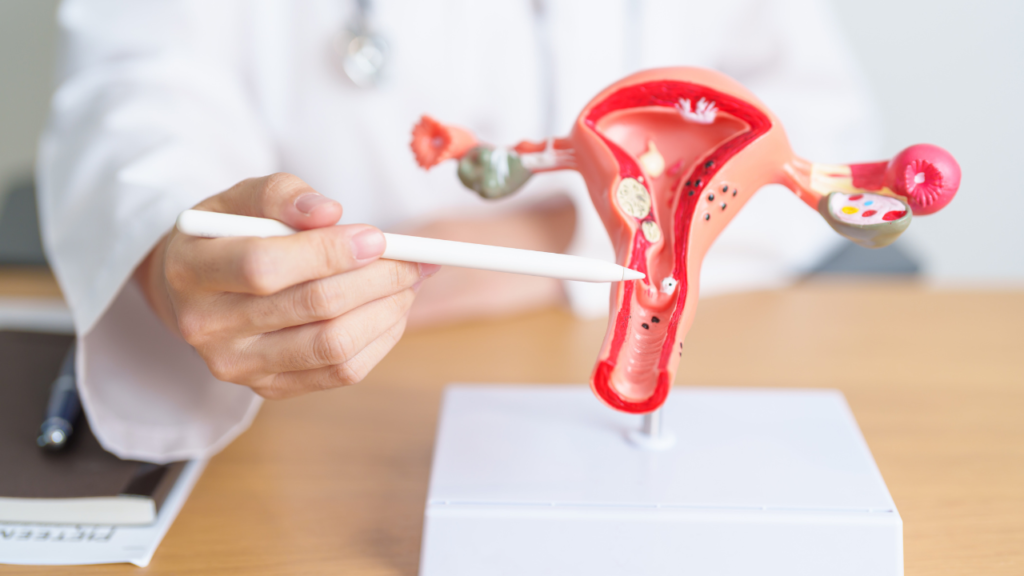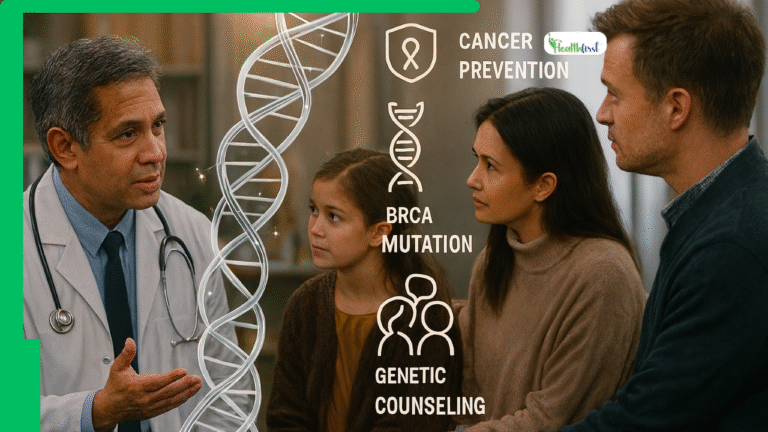Introduction
Uterine fibroids, or leiomyomas, are non-cancerous growths that develop in the uterus and affect a significant portion of women during their reproductive years. These growths can range in size from tiny, undetectable nodules to large masses that distort the uterus and cause discomfort. Although uterine fibroids can be asymptomatic, they often lead to symptoms such as heavy menstrual bleeding, pelvic pain, and even infertility.
Recent studies suggest that working women, particularly those with high-stress jobs, may be at greater risk of developing uterine fibroids. Factors such as stress, poor dietary habits, and a sedentary lifestyle can contribute to the development of these fibroids. This blog will explore why working women may have a higher risk of uterine fibroids and provide actionable tips on preventing this condition.
What Are Uterine Fibroids?
Uterine fibroids are benign tumors that develop within the muscle tissue of the uterine wall. These fibroids can vary in size, and their growth is influenced by hormones such as estrogen and progesterone. While fibroids are not cancerous, they can cause significant discomfort, including heavy periods, pelvic pressure, and even complications like infertility.
Fibroids are particularly common in women of reproductive age, especially between 30 and 50. Various factors, including genetic predisposition, hormonal imbalances, and lifestyle choices, contribute to their development.
Why Working Women Are at Higher Risk of Uterine Fibroids
Working women, especially those in high-pressure environments, tend to experience elevated stress levels and engage in behaviors that may increase the likelihood of developing fibroids. Below are the main reasons why working women are at higher risk:
Chronic Stress
High-pressure work environments often lead to chronic stress, which can significantly affect hormone levels. Prolonged stress causes the body to produce excess cortisol, a hormone that can disrupt the balance of estrogen and progesterone. Since fibroid growth is influenced by estrogen, this imbalance can promote the formation of fibroids. Additionally, stress weakens the immune system, reducing the body’s ability to repair tissues and regulate cell growth, thus creating an environment where fibroids can flourish.
Sedentary Lifestyle
Many working women, particularly those in desk jobs, spend long hours sitting in one place, leading to a sedentary lifestyle. A lack of physical activity can result in weight gain and metabolic imbalances, both of which are linked to fibroid development. Excess body fat can increase estrogen production, further promoting the growth of fibroids.
Poor Diet Choices
With busy schedules, many working women resort to convenient but unhealthy dietary options like fast food and sugary snacks. Poor nutrition not only leads to weight gain but also disrupts hormonal balance, making it easier for fibroids to grow. Diets high in refined sugar, unhealthy fats, and processed foods can contribute to hormonal imbalances, exacerbating the risk of fibroid development.
Delayed Childbearing
Women who delay childbirth or choose not to have children may be at a higher risk of developing fibroids. Pregnancy and breastfeeding naturally lower estrogen levels, which can reduce the risk of fibroid growth. Women who have fewer pregnancies or delay having children may experience prolonged exposure to estrogen, increasing the likelihood of fibroids.
How Stress Affects Uterine Health
Stress is one of the most significant factors influencing fibroid development in working women. When the body is under stress, it produces cortisol, which can interfere with estrogen regulation. This hormonal imbalance can create an environment where fibroids are more likely to develop. Additionally, prolonged stress weakens the immune system, making it harder for the body to repair damaged tissues and regulate cell growth, contributing to the formation and growth of fibroids.
Preventing Uterine Fibroids for Working Women
Although certain risk factors, such as genetics and age, cannot be changed, working women can adopt several lifestyle changes to reduce the risk of fibroids. Below are some effective strategies to prevent uterine fibroids:
1. Stress Management
Since stress plays a major role in fibroid development, managing stress effectively is crucial. Here are some strategies for reducing stress:
- Meditation and Mindfulness: Practices such as meditation, deep breathing exercises, and mindfulness techniques can help lower cortisol levels and promote relaxation.
- Exercise: Regular physical activity, such as walking, jogging, or yoga, releases endorphins, the body’s natural stress relievers. Even a 30-minute walk during your lunch break can help reduce stress.
- Work-Life Balance: Establishing a healthy work-life balance by setting boundaries and taking breaks can help alleviate work-related stress and lower cortisol levels.
2. Maintain a Healthy Weight
Obesity and excess body fat increase the production of estrogen, which is linked to fibroid growth. Working women can maintain a healthy weight by incorporating the following practices into their routine:
- Regular Exercise: Aim for at least 30 minutes of moderate-intensity exercise, such as brisk walking, swimming, or cycling, five times a week.
- Balanced Diet: Consume a nutrient-rich diet filled with whole foods, including fruits, vegetables, lean proteins, and whole grains. Avoid processed foods high in sugar, refined carbohydrates, and unhealthy fats.
3. Improve Your Diet
A well-balanced diet is essential for hormonal balance and fibroid prevention. Here are some dietary tips to reduce the risk of uterine fibroids:
- Increase Fiber Intake: A high-fiber diet promotes healthy digestion and helps regulate estrogen levels. Foods such as beans, lentils, oats, and leafy greens are excellent sources of fiber.
- Cruciferous Vegetables: Vegetables like broccoli, cauliflower, and Brussels sprouts contain compounds that support estrogen detoxification and balance hormone levels.
- Limit Red Meat: High consumption of red meat has been associated with elevated estrogen levels and an increased risk of fibroids. Consider replacing red meat with lean proteins like chicken, fish, or plant-based options.
4. Regular Check-Ups
Routine visits to your gynecologist can help detect fibroids early before they become problematic. Pelvic exams and ultrasounds are effective diagnostic tools that can identify fibroids in their early stages.
5. Natural Supplements
Certain supplements may help balance hormones and reduce fibroid risk:
- Green Tea Extract: Green tea is rich in antioxidants and has anti-inflammatory properties that may inhibit fibroid growth.
- Vitamin D: Adequate levels of Vitamin D have been associated with a lower risk of developing fibroids. Consider taking a supplement if you do not get enough sunlight exposure.
- Omega-3 Fatty Acids: Found in fish like salmon and flaxseeds, omega-3 fatty acids have anti-inflammatory properties that may prevent fibroid formation.
6. Reduce Alcohol and Caffeine Intake
High alcohol and caffeine consumption can interfere with hormone regulation and increase estrogen levels, contributing to fibroid growth. Reducing your intake of these substances can help balance hormones and lower the risk of fibroid development.
Treatment Options for Uterine Fibroids
If you already have fibroids, there are several treatment options available:
- Medication: Hormonal treatments can help shrink fibroids and manage symptoms but will not eliminate fibroids entirely.
- Surgery: For severe cases, surgical options like myomectomy (removal of fibroids) or hysterectomy (removal of the uterus) may be necessary.
- Non-invasive Treatments: Newer treatments such as MRI-guided focused ultrasound surgery (FUS) and uterine artery embolization (UAE) offer less invasive alternatives to traditional surgery.
Conclusion
While working women face a higher risk of developing uterine fibroids due to lifestyle factors like stress, poor diet, and a sedentary lifestyle, there are numerous preventive measures that can significantly lower this risk. Managing stress, maintaining a healthy weight, eating a balanced diet, and attending regular check-ups can go a long way in preventing fibroids and ensuring long-term uterine health.
By taking proactive steps to balance hormones and reduce stress, working women can protect themselves from the discomfort and complications associated with fibroids. Prioritizing your health amid a busy career is essential for living a balanced and fulfilling life.









